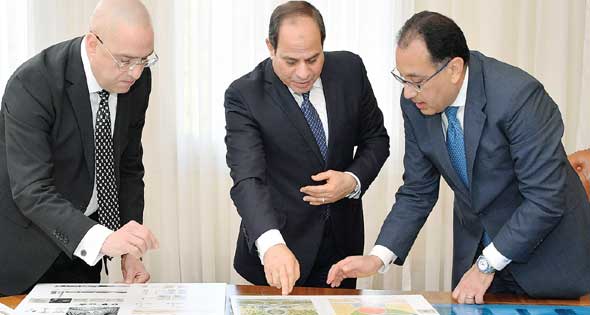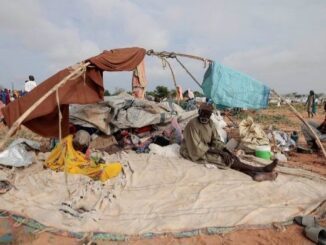
Stakes in these companies will be offered to individual and strategic investors, Prime Minister Mostafa Madbouly says
The Egyptian government plans to sell stakes in 32 state-owned companies, in everything from electricity and banking to hotels, including three major banks and the country’s largest insurer, to the private sector.
Egyptian prime minister Mostafa Madbouly announced on two days ago that his government plans to offer stakes in 32 state-owned enterprises from now until the end of the first quarter of 2024.
Madbouly told a news conference that they include three banks and two military-owned companies. The companies will be offered to individual and “strategic” investors, he added.
The companies are 12 more than what Madbouly said last week would be available in initial public offerings.
Egypt’s economy has long been dominated by the state and increasingly by the military, creating less space for private firms to thrive. And the country has promised privatization before, only to not follow through. Madbouly didn’t say whether the stakes would be minority shares in the companies or outright control.
This time, though, the promise comes amid tough economic times for Egypt, which is struggling to stabilize its economy and pay off debts at a time when the war in Ukraine sent inflation higher and raised the cost of importing grains, causing foreign investors to flee and sending the Egyptian pound plummeting.
The banks to be offered are Banqu Du Caire, Arab African International Bank and United Bank of Egypt. The two military-owned companies are Safi, which produces bottled mineral water, and Wataniyah, a nationwide chain of petrol stations.
He said the companies cover activity in 18 economic sectors, including energy, transport, electricity and insurance.
IPOs of at least 25 per cent of these companies will be carried out in the next six months, said Madbouly.
Egypt has for years spoken about privatizing state-owned companies, but the plan took on added urgency following the outbreak of the Russia-Ukraine war nearly a year ago, which has had a devastating impact on the nation’s economy.
The coronavirus pandemic also affected Egypt severely and its economic problems include a foreign currency crunch and double-digit inflation. Its currency has lost about 50 per cent of its value since March last year.
“This is a step that confirms the seriousness of the state in doing what it has pledged to do,” said the prime minister.
“This is a cash flow situation,” Rami El Dokany, chairman of the Egyptian Stock Exchange told The National in an interview earlier this week. “Once the cash flow has been resolved, we’re going to see more interest, and more inflows happening.
“I think the IPO program will play a big role in making things happen.”
Egypt in December agreed to a $3 billion rescue plan with the International Monetary Fund. The deal is contingent on the country introducing a flexible foreign exchange regime and reducing the state’s footprint in the economy to allow more room for the private sector.
Madbouly’s announcement came one day after Moody’s Investors Service downgraded Egypt’s credit rating to B3 from B2, owing to what it called the country’s reduced external buffers and shock absorption capacity as it pursues economic reforms and structural changes.
However, the country’s outlook was changed to stable from negative, it said.
The rating downgrade, which takes Egypt deeper into junk territory, takes place as the most populous Arab nation strives to move towards a more export, and private sector-led growth model under a flexible exchange rate regime.
Moody’s said the Egyptian government’s state-owned asset sale strategy will support its structural adjustment and help generate sustained non-debt creating capital inflows to meet increased external debt service payments over the next two years.
Egypt’s foreign debt is thought to be more than $150 billion, making it one of the most indebted countries in the Middle East.
The International Monetary Fund last year agreed to lend Egypt $3 billion in exchange for reforms, including dormant plans to sell stakes in state firms. The Egyptian government recently said it would also cut spending, including travel by government officials and some state-investment projects.
As part of the IMF deal, Egypt pledged to reduce the role of state and military-owned companies in favor of private businesses in the economy.
But many private entrepreneurs in Egypt and the broader Gulf region are taking a wait-and-see approach, saying that previous promises to privatize and level the playing field for private firms didn’t happen.
Madbouly said in his speech that authorities will begin offering stakes at the end of March and may add more companies to the sale list the coming year. The sales show how serious authorities are about withdrawing from the private sector, he said.
Egypt’s opaque business environment and the involvement of its military in so many sectors could continue to put off investors, said James Swanston, economist at London-based research firm Capital Economics. At the same time, the nearly 50% drop in the value of the Egyptian pound to the U.S. dollar in the past year has made prices far more attractive.
“There will certainly be appetite given the fall in the currency,” Mr. Swanston said.
Egypt still needs $14 billion in funding from international creditors in the next four years, on top of the $3 billion in loans from the IMF, according to the international creditor. Of that, the country is aiming to raise some $2.5 billion in the public offering of state assets by this June, according to the IMF.
Egyptian authorities have sold some minority stakes in the past year to sovereign-wealth funds in Saudi Arabia and the United Arab Emirates.
The National Bank of Egypt, for example, sold stakes in Commercial International Bank and Abu Qir Fertilizers & Chemical Industries Co., worth around $910 million and $351 million respectively, to Abu Dhabi Developmental Holding Co.
Some of the companies the prime minister’s cabinet listed for sale—such as military-owned Wataniya Petroleum and the National Company for Producing and Bottling Water, known as Safi—had already been disclosed by the government. Sales of the oil-and-gas firm and the water producer have dragged on with no details on the size of the stakes that authorities are willing to offer.
Inflation continues to surge
On the other hand, Egypt’s annual inflation surged to a new high in January as the country continues to battle ongoing price hikes and a depreciating currency, the Egyptian statistics bureau said on Thursday.
The state-run Central Agency for Mobilization and Statistics published figures showing that the annual inflation stood at 26.5% last month, up from 21.9% in December. In January 2022, the same figure stood at just 8%, before spiking after the outbreak of Russia’s war in Ukraine the following month, shaking the world economy.
During January, the prices of basic commodities in Egypt rose steadily. The cost of bread and cereal increased on average by 6.6% while the price of meat and poultry climbed by 20.6%, the bureau said.
The Egyptian economy has been hit hard by years of government austerity, the coronavirus pandemic and the fallout from the war in Ukraine. Egypt is the world’s largest wheat importer, with most of its imports having traditionally come from eastern Europe.
Greatly affected by the enduring hikes are Egypt’s lower-income households, most of whom are reliant on government subsidies for basic goods such as bread. Nearly 30% of Egyptians live in poverty, according to official figures.
In December, Egyptian authorities and the International Monetary Fund agreed on a $3 billion bail-out package to ease the crisis. The IMF deal was struck in exchange for Egypt implementing a number of economic reforms, including a shift to a flexible exchange rate. The deal also allows for a further $14 billion in possible financing for Egypt.
The value of the Egyptian pound has continued to slide following its decision to shift to a flexible exchange rate. The currency has lost around 50% of its value against the dollar since the start of 2022.
Economists have long criticized the economic dominance of the Egyptian government and the army, labelling it a barrier to private sector growth. However, the Egyptian government on Wednesday unveiled plans to sell stakes in dozens of state-controlled companies, including banks and energy firms
Egypt is also facing a foreign currency shortage. Many banks have placed limits on foreign cash withdrawals, while Egypt’s government announced it is postponing numerous future projects that would require significant foreign expenditure.



